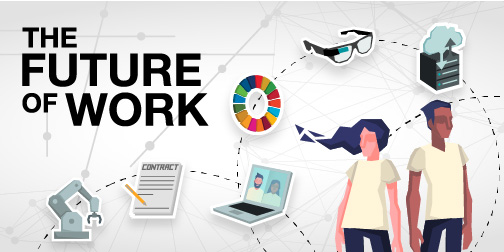How we work is rapidly evolving, and the pandemic has only accelerated this transformation. As more companies embrace remote work and digital technologies, the traditional 9-to-5 office-based model is becoming obsolete. In this blog, we’ll explore some key trends and predictions for the future of work.
Remote Work is Here to Stay
The pandemic forced many companies to switch to remote work almost overnight, and it’s clear that this trend is here to stay. Many employees have discovered the benefits of working from home, and companies have realized that remote work can be just as productive as traditional office-based work.
According to a survey by Upwork, 36.2 million Americans will be working remotely by 2025, an 87% increase from pre-pandemic levels. This shift towards remote work will significantly impact how companies operate, from their hiring practices to their real estate needs.
Digital Transformation is Accelerating
The pandemic has also accelerated the adoption of digital technologies in the workplace. Companies invest in tools like video conferencing, collaboration software, and project management platforms to keep their remote teams connected and productive.
In the future, we can expect to see even more advanced technologies in the workplace, such as augmented and virtual reality. These technologies will allow employees to work together in immersive digital environments, regardless of physical location.
Focus on Employee Well-being
The pandemic has highlighted the importance of employee well-being. Companies prioritizing their employees’ mental and physical health are more likely to retain top talent and create a positive work culture.
In the future, we expect to see more companies investing in wellness programs, flexible work arrangements, and mental health resources for their employees. Employers may also provide more support for work-life balance, such as paid time off for self-care or caregiving responsibilities.
Shift towards Gig Work
The rise of the gig economy has been a major trend in recent years which is expected to continue. As more workers seek flexibility and independence, we hope to see a shift towards gig work, especially in industries like hospitality, retail, and healthcare.
For employers, this means rethinking their hiring practices and finding new ways to attract and retain gig workers. They may need to offer more competitive pay rates, benefits, and opportunities for skill-building and career advancement.
Emphasis on Diversity, Equity, and Inclusion
Diversity, equity, and inclusion (DEI) have become increasingly important in the workplace, and this trend is expected to continue. Companies prioritizing DEI are more likely to attract top talent, build stronger teams, and create a more positive work culture.
In the future, we expect to see more companies investing in DEI initiatives, such as training programs, mentorship opportunities, and affinity groups. Employers may also prioritize DEI in their hiring practices by actively seeking candidates from diverse backgrounds and creating more inclusive job postings.
Conclusion
The future of work is rapidly evolving, and companies that adapt to these changes will be more successful in the long run. Remote work, digital transformation, employee well-being, gig work, and DEI are just a few of the key trends that will shape the future of work. By staying ahead of these trends and embracing new ways of working, companies can create a more flexible, productive, and inclusive workplace for their employees.









